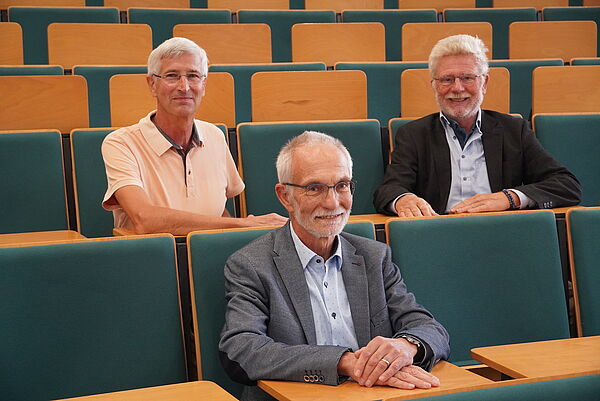In addition to the electrical engineering degree program, mechatronics was introduced as a new degree program for the first time in 1998 in the Department of Electrical Engineering and Computer Engineering at today's Ostwestfalen-Lippe University of Applied Sciences (TH OWL).
Both were diploma courses of study. Three professors in the department suggested that an international master's degree program also be established. Professor Dr. Ernst Beckmann, Professor Dr. Thomas Korte and Professor Dr. Uwe Meier did not let themselves be put off by admonishing comments during the planning phase, which lasted several years, and launched the master's program in Information Technology as the department's third program in 2003 - and thus also the first master's program ever at TH OWL.
With only three professors, the department could not offer this degree program.
However, support from international partners made it possible."With Halmstad University from Sweden and the Danish study site in Esbjerg, which belongs to Aalborg University, the study program was launched as an international trilateral rotation model," reports Professor Dr. Uwe Meier, the dean in office at the time, looking back.All students started the first semester in Halmstad, then transferred to Lemgo and went to Esbjerg for the third semester. In the fourth semester, the master's thesis was worked on at one of the three study locations. A Pakistani student who returned to Lemgo for his master's thesis said at the reception in the town hall of the University and Old Hanseatic City of Lemgo: 'Returning to Lemgo is like coming home'."
The department found important support in local industry.
With Professor Dr. Jürgen Jasperneite and Professor Dr. Volker Lohweg, two lecturers who later became professors of the department provided support. In addition, industrial scholarships were obtained and awarded.The program was also perceived as positive for the department when additional professorships were filled.At the beginning of the program, the new professors Dr. Reinhard Doleschal, Dr. Stefan Heiss and Dr. Stefan Witte were an excellent team. Kerstin Rosemann from the International Office was instrumental in ensuring that all students felt at home in Lemgo.
Uwe Meier: "This study model was unique in Germany at the time. And although it couldn't actually work, we just did it."
During the first welcome to the students, the Dean introduced the study objectives:
- enhance skills to develop and understand advanced products and systems for today's information and communications market in response to the shortage of highly skilled human resources.
- define an added value of academic substance beyond what each institution could offer on its own.
- Involve specific local businesses that contribute to improving the employability of graduates.
- Have students experience three different countries and their specific educational systems in a class-based rotation model.
Present were 19 students from eight countries: Germany (3), Denmark (2), France (2), India (6), Mexico (1), Thailand (1), Turkey (2), Venezuela (2). One of the three German students was a young, up-and-coming man named Henning Trsek. As the first graduate of this master's program, he earned his doctorate in engineering as a research assistant at the Institute for Industrial Information Technology (inIT) at TH OWL and returned to the department as a professor after a stint in industry.
Outlook
Two decades after its founding, the Master Information Technology program remains a pioneer in its field. The "Future World Empowerment Program", newly developed in 2023, aims to prepare students to take responsibility in an increasingly complex world and will be tested for the first time in this degree program.
This comprehensive approach not only takes into account the previous technical aspects ("How do I solve a technical problem?"), but also places great emphasis on the economic, social and ethical dimensions of information technologies ("Why/for what am I doing this?"). "In this way, we are taking a new holistic approach to engineering and computer science and making STEM studies even more attractive to young people," emphasizes initiator Jürgen Jasperneite .
In view of current societal challenges, the program thus addresses the central question of how to shape a lifestyle that is suitable for individuals as well as for local and global communities - a lifestyle, in other words, that enables a sustainable harmony of science, technology, economy and nature.
According to Jasperneite, the success story of the Information Technology master's program is "not only a milestone for TH OWL, but also for the city and its citizens. It represents a place where innovation, academic excellence and a welcoming culture have found a home and continue to create new momentum." True to the motto, "Everyone said, 'You can't do that!' Then some came along who didn't know and just did it."


